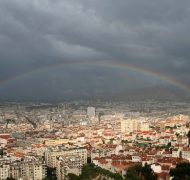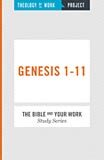God’s Covenant with Noah (Genesis 9:1-19)
Bible Commentary / Produced by TOW Project
Once again on dry land with this new beginning, Noah's first act is to build an altar to the Lord (Gen. 8:20). Here he offers sacrifices that please God, who resolves never again to destroy humanity "as long as the earth endures, seedtime and harvest, cold and heat, summer and winter, day and night, shall not cease" (Gen. 8:22). God binds himself to a covenant with Noah and his descendants, promising never to destroy the earth by flood (Gen. 9:8-17). God gives the rainbow as a sign of his promise. Although the earth has radically changed again, God’s purposes for work remain the same. He repeats his blessing and promises that Noah and his sons will “be fruitful and multiply, and fill the earth” (Gen. 9:1). He affirms his promise of provision of food through their work (Gen. 9:3). In return he sets requirements for justice among humans and for the protection of all creatures (Gen. 9:4-6).
The Hebrew word translated "rainbow" actually omits the sense of “rain.” It refers simply to a bow—a battle and hunting tool. Waltke notes that in ancient Near East mythologies, stars in the shape of a bow were associated with the anger or hostility of the god, but that “here the warrior’s bow is hung up, pointed away from the earth.”[1] Meredith Kline observes that "the symbol of divine bellicosity and hostility has been transformed into a token of reconciliation between God and man."[2] The relaxed bow stretches from earth to heaven, from horizon to horizon. An instrument of war has become a symbol of peace through God's covenant with Noah.








